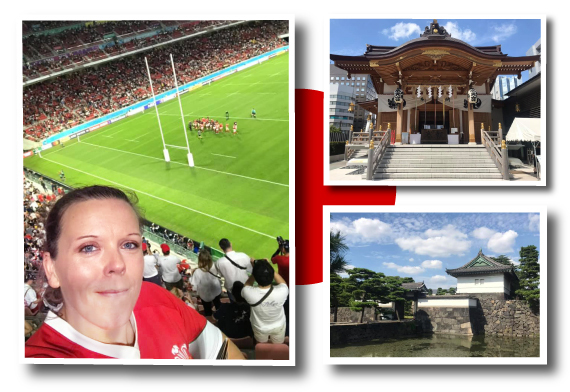As someone who plays and loves rugby, I could hardly believe it when, in September, I finally landed in Tokyo. I was ready to spend the next two weeks travelling around Japan to watch four Rugby World Cup pool games.
Like most people, I usually plan trips six months or so in advance – but this had been four years in the making.
From the minute I landed home from the slightly closer (England and Wales) 2015 RWC, I knew I had to go again. When I realised that meant embarking on my first trip to Asia, there was no question – time to start saving!
As with any financial budgeting, it was time to estimate costs: flights, accommodation, train travel, match tickets, sightseeing, food, drinks, etc.
I then had to factor in a few reasonable assumptions. In four years’ time, prices will likely have risen due to inflation. Additionally, the fact that it was the Rugby World Cup also meant that prices might be at a premium.
With my scary figure finalised, it was time to save.
What happened next was a combination of a trip back to childhood and a reminder of the sheer joy of setting a goal, achieving it, and enjoying the rewards of your efforts.
As a child, I remember saving for anything I happened to want. Birthday money, pocket money and anything extra that I had managed to earn by helping family or neighbours would go in a pot until I had enough. There was no option to borrow – you saved first and then you got.
My banking app (like most) has the ability to add a savings target. Before I knew it, I was addicted to checking my progress. Having that savings target made me more conscious of my spending habits. All of a sudden, I had started to prioritise my bigger, future life events over the short-lived joy of a random purchase.
In time, I hit my target and was able to make my plans a reality.
The advantage of having an assigned budget is this: you have already given yourself the permission and freedom to spend. I found myself booking the most convenient/practical options rather than the cheapest. I rediscovered the concept of value! I wasn’t wasteful and, though I still found the prices of some of the official merchandise eyewatering(!), I managed to buy and do all the things on my list.
I didn’t always convert the prices to pounds either. I simply had enough to have it/do it – whatever ‘it’ was – because I had saved.
The benefits didn’t stop at the end of the trip either. On my return, I was free to start saving for the next target: RWC France 2023!
My planning and saving had been more than a money exercise. I’d effectively ‘bought’ myself the freedom to enjoy experiences that I may not have had travelling on borrowed money either through credit cards or loans. I was no longer cost conscious; I was value conscious.
So, what did I learn?
1 – Japan is a must-visit country and you have to see as much of it as possible. The efficiency of their transport system makes it so easy to get around and each city is a completely different experience
2 – There is no such thing as too much rugby in my world and watching the Japanese embrace the tournament was a joy.
3 – Saving buys freedom! And that is worth so much more than the price tag.
4 – Setting a target and achieving a goal gives you focus and a sense of achievement.
5 – When you are conscious about spending, you waste less and spend more.
Do things today with ‘future you’ in mind. I was happy to make small sacrifices because I knew how much it was going to benefit ‘future me’. I was focused and knew that the future experience was more important to me. The joy and experiences I have taken away are worth so much more to me than the short-term buzz of impulse purchases of things I really don’t need.
If you want something or want to do something – and I mean really want to – do it!
Work out a budget, set a target, get saving and enjoy the outcome which is so much more than the monetary.
At Thornton, we believe that good financial planning has the power to genuinely change your life.
If you’d like to talk to us about how our Life-Centred approach can help you realise your goals and aspirations, get in touch: Contact Us


